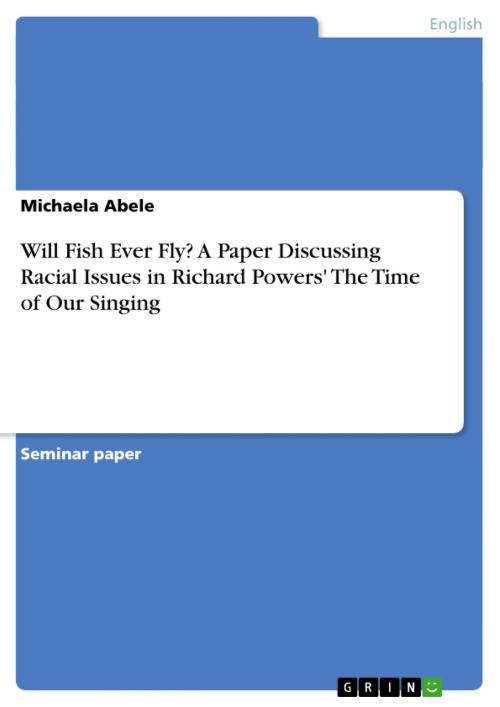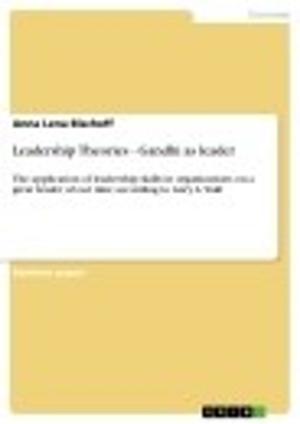Will Fish Ever Fly? A Paper Discussing Racial Issues in Richard Powers' The Time of Our Singing
Nonfiction, Entertainment, Drama, Anthologies| Author: | Michaela Abele | ISBN: | 9783638442602 |
| Publisher: | GRIN Publishing | Publication: | November 27, 2005 |
| Imprint: | GRIN Publishing | Language: | English |
| Author: | Michaela Abele |
| ISBN: | 9783638442602 |
| Publisher: | GRIN Publishing |
| Publication: | November 27, 2005 |
| Imprint: | GRIN Publishing |
| Language: | English |
Seminar paper from the year 2005 in the subject American Studies - Literature, grade: 1.25, University of Stuttgart, course: Hauptseminar: Recent American Fiction, 11 entries in the bibliography, language: English, abstract: 'The bird and the fish can fall in love.' A catchy saying, that suggests the possibility of a highly unconventional pairing. Nevertheless, it immediately evokes a non-trivial question: 'But where will they build their nest?' Paradoxically, the saying starts off conveying hope for bird and fish's unequal relationship, yet its continuation instantly deprives it of all its initial confidence again, leaving behind only a dull prospect of this couple's common future. It seems as if there is only little chance for the two to set up a family - though it is not said to be impossible. However, even if bird and fish eventually managed to find an apt nesting place, how would their story go on? Would they be able to live together? Could they survive at the periphery of their habitats? Apart from those questions dealing with the couple itself, some of the most interesting questions arising would certainly concentrate on their progeny, and in how far they would combine parental features - or differ from fish and bird respectively. Would either of their parental lines dominate the other? And if so, which aspects of life would this dominance affect? Would it go as far as to predict which habitat fish and bird's progeny would occupy at last? In his latest novel, The Time of Our Singing, Richard Powers applies this saying to the situation of interracial marriages and their mixed-race offspring in the twentieth century US society. He portrays a black-and-white couple's ambitions to overcome the enormous obstacles associated with realizing the seemingly impossible: setting up a mixed-race family and raising their children 'beyond race' (Powers 424). Yet despite all their efforts and sacrifices, the couple's endeavors fail; this actually is mirrored not only by their own lives, but also by the lives of their hybrid children, neither of whom makes it 'beyond race' in the end. However, is this meant to imply that racial boundaries are so powerful that they cannot be overcome? Is it as unlikely to find a way interfacing black and white as it is suggested by the desperate situation of fish and bird?
Seminar paper from the year 2005 in the subject American Studies - Literature, grade: 1.25, University of Stuttgart, course: Hauptseminar: Recent American Fiction, 11 entries in the bibliography, language: English, abstract: 'The bird and the fish can fall in love.' A catchy saying, that suggests the possibility of a highly unconventional pairing. Nevertheless, it immediately evokes a non-trivial question: 'But where will they build their nest?' Paradoxically, the saying starts off conveying hope for bird and fish's unequal relationship, yet its continuation instantly deprives it of all its initial confidence again, leaving behind only a dull prospect of this couple's common future. It seems as if there is only little chance for the two to set up a family - though it is not said to be impossible. However, even if bird and fish eventually managed to find an apt nesting place, how would their story go on? Would they be able to live together? Could they survive at the periphery of their habitats? Apart from those questions dealing with the couple itself, some of the most interesting questions arising would certainly concentrate on their progeny, and in how far they would combine parental features - or differ from fish and bird respectively. Would either of their parental lines dominate the other? And if so, which aspects of life would this dominance affect? Would it go as far as to predict which habitat fish and bird's progeny would occupy at last? In his latest novel, The Time of Our Singing, Richard Powers applies this saying to the situation of interracial marriages and their mixed-race offspring in the twentieth century US society. He portrays a black-and-white couple's ambitions to overcome the enormous obstacles associated with realizing the seemingly impossible: setting up a mixed-race family and raising their children 'beyond race' (Powers 424). Yet despite all their efforts and sacrifices, the couple's endeavors fail; this actually is mirrored not only by their own lives, but also by the lives of their hybrid children, neither of whom makes it 'beyond race' in the end. However, is this meant to imply that racial boundaries are so powerful that they cannot be overcome? Is it as unlikely to find a way interfacing black and white as it is suggested by the desperate situation of fish and bird?















